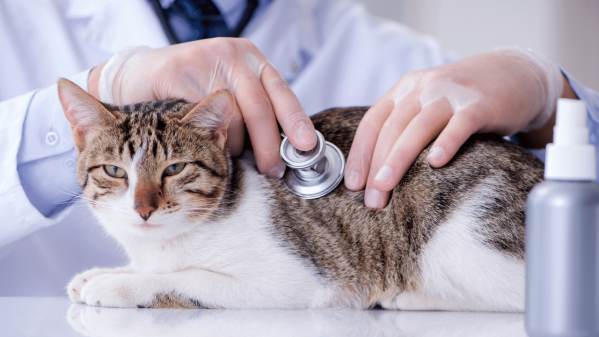Regular visits to the doctor are important to stay healthy and on top of illnesses and conditions before they get too advanced. This is true for adults, and children — and also for our cats! But how often are “regular” visits, actually? How often should your cat being going to the vet? Well, the answer relies on a few factors — namely age and health history.
Much as infants, children, adults, and older adults have different health needs and considerations, the same is true for our cats! Today we explore how often you should take your cat to the vet to keep them happy and healthy. If you're also interested in how much the vet costs once you get there, take a look as well.
How often do you take a kitten to the vet?
There’s nothing like a brand-new baby kitty! Kittens, like infants, have some special health considerations to take care of during their first weeks of life. But how often should your kitten go to the vet? Cats are considered kittens from birth to 1 year of age and should visit the vet every three to four weeks during those early months.
"During these visits, a series of vaccinations are administered. Routine stool checks are also advised to check for the presence of parasites, which are common during this life stage and dewormers administered thereafter,” explains Dr. Maureen Murithi DVM.
It’s also important for the kitten to visit their vet at this time to get a full examination that may include things like measuring temperature, heart rate, and how the kitten's breathing sounds. But that’s not all: "Mucous membranes (eyes and gums) are also checked in case of anemia/jaundice. Abdominal palpation helps to check for pain, bowel movements, bladder infections, organ enlargement as well as any signs of congenital anomalies," adds Dr. Murithi.
How often do you take an adult cat to the vet?
Your kitty is a big boy (or girl!) now. It’s amazing how soon a kitten grows into an adult cat. Cats are considered adult from the age of 1 to 10 years. Adult cats should have a wellness check-up at least once a year.
"During the visit, annual vaccinations are administered as well as deworming. Wellness bloodwork is highly recommended, which helps to inform the state of health of your cat," says Dr. Murithi. It also offers a great way to detect early signs of disease, which can help with prevention before it becomes a more severe problem that would need to be treated.
The work isn’t all on the vet at this visit, though. As a pet parent, it’s also our job to take this time to let the doctor know about what they are noticing going on with the pet environmentally. Are they on any medications or supplements? What is their diet like? Has there been any changes in their behavior, energy levels, even bathroom habits? That way the vet can see if the cat is suffering from allergies, malnutrition, obesity, or other issues.
Dental checks are also conducted during this visit. "This helps to look out for early signs of gum disease as well as plaque and tartar build-up which will inform if dental cleaning is required," says Dr. Murithi.
"Heartworm medication and tick and flea treatment may also be administered especially for outdoor cats at this visit," adds Dr. Murithi.
How often do you take a senior cat to the vet?
In the blink of an eye, it seems, our kittens are seniors. And as with humans, senior cats do have special health concerns. In senior cats, which are cats that are 10 years old and older, the cat should visit the vet for wellness checkups at least twice every year (around every six months).
The reason that cats have to visit the vet more often at this age is because it makes it more likely the doctor will notice disease in its early stages, which are more likely at that age. "Blood biochemistry, complete blood count, thyroid bloodwork, and urinalysis should be done annually regardless of the state of health of the cats," says Dr. Murithi.
As with other stages in the cat's life, it's also very important that the cat’s owners pay attention to their diet and behavior in the time before the appointment so they can tell the vet. "Pet parents should also be keen to observe their cat behavior prior to the visit of any changes in their cats in terms of gait, postures, exercise tolerance, and litter box behavior," says Dr. Murithi.
This will assist the vet in making an informed early diagnosis in case he/she finds anything of concern. Routine dental assessment and cleaning are mandatory as they are highly susceptible to plaque and tartar build-up and gum disease. Annual vaccinations should be administered as usual.
But if you’ve just been to your regular visit and a month later, you notice unusual symptoms or behaviors, don’t be shy about contacting your vet and seeing if another sooner appointment is necessary. "The doctor can help you determine when (or if) your cat needs to be seen and what you should do in the meantime," says Dr. Murithi.
When do you take a cat to the vet in an emergency?
There's no "right amount of times" to take your cat to the vet in the event of an emergency. If you believe your cat is in danger, you should take your cat to a vet clinic immediately. If you are unsure whether or not your cat is experiencing an emergency, you can also talk to a vet online.
Online vet services, like Pawp, offer teleadvice and triage from the comfort of your home. If you're not sure if your pet is having an emergency or if you have a question you don't want to wait until your next vet visit to ask, talk to a vet online.
